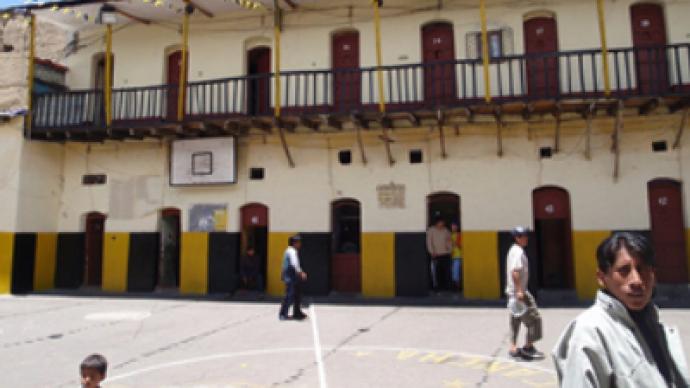Brad Pitt cleans up Bolivian prison

The infamous tours of La Paz’s San Pedro penitentiary have been closed. The government has ended the cocaine-and-criminals prison circuits, shamed by the movie “Marching Powder”.
A former not-to-be-missed experience on the backpackers’ trail of South America has ended. Exposure surrounding “Marching Powder” – a forthcoming Brad-Pitt-directed film – has shamed the government into cleaning up the notorious San Pedro prison.
The movie is based on the book about the real experiences of a British drug dealer, Thomas McFadden – played by Don Cheadle – who was incarcerated in the prison. To bring in an income, he ran tours, which were so popular they were listed in the backpacker bible, Lonely Planet.
Victims of their own success
Ultimately, the tours – taken on by other guides – were victims of their own success. Now, La Paz’s correctional facility is being corrected, ending one of the world’s most peculiar penitentiaries.
The rules surrounding visiting wives, children and prostitutes are being tightened. San Pedro’s in-house cocaine factories – suppliers of the “finest cocaine in South America” have been closed. Local office workers will have to eat elsewhere.
“We had been looking forward to this since we left Machu Picchu,” said Robin, as he and his fellow British gap-year travelers were waved away by guards from the adobe-brick penitentiary. The wardens are now regularly changed to prevent the temptation of bribery becoming a
habit.
Chumita Mismo, 30, has been visiting an imprisoned friend for 8 years and has noticed the changes. He said: “Since the old corrupt governor was removed, there are far fewer drugs and less alcohol inside the prison.”
The strangest tourist attraction
The tours were a window into an extraordinary combination of the dangerous and the mundane.
“It was the most bizarre tourist attraction – absolutely fascinating but quite intimidating as you feel totally at the prisoners’ mercy,” said Claire Hutchings, 29, who took the US$35 tour before the crackdown.
“If you didn’t know you were mingling with criminals, it would seem like just a normal bustling suburb of La Paz – it’s an outdoor prison and there are shops, cafés, restaurants, grassy areas, sports facilities and hawkers wandering around selling their wares. You even see the prisoners’ wives and children wandering around,” she added.
Into a small society
Martina Hibell, 27, a Swedish charity employee working for the welfare of the inmates, described her experiences in the prison: “It really is a small society – the prisoners are people just like everybody else, yet some of them have committed terrible crimes.”
Visiting was not always a comfortable experience, she said: “I was the only white woman in there and I could really feel the eyes starring at me.”
Prison bosses sacked
Stung by the exposure, including YouTube videos and a television documentary, the government has vowed to end the prison’s “atmosphere of liberty”. The regime change has begun at the top with the sacking of the previous prison authorities. According to Alfredo Rada, Interior Minister, the new appointees are charged with “cleaning up all the irregularities that could be found in that jail”.
To stop foreign visitors having access, the new administration have locked a side door, which was used by the tour guides and gave access to the most exclusive section of the prison.
Comfort for sale
The prison is split into eight sections of wildly varying degrees of comfort – from comparative luxury to utter squalor. The old system of prisoners buying their cells, with amenities relative to the amount paid, will be dismantled. Instead, the standard of living will reflect the severity of the crime.
The expulsion of prisoners’ wives, sisters, grandmothers and children has caused the most consternation. Previously they could come and go at will; dozens of impoverished Paceñas took advantage of the accommodation. Their presence also kept the men calm, claimed one of the guards.
Fight to keep old ways
There were riots when the new rules were put in place. More than 20 people were injured in the bloody confrontation, in which the prisoners called for the sacking of the new Chief of Security. A hunger strike led to the resignation of a prison director, but the new system of visiting hours has not been cancelled.
This is not the first crack down on the San Pedro’s unique system. Corruption can easily creep back and with it, one of Bolivia’s few man-made tourist Meccas may yet return.
Jonathan Stibbs for RT













